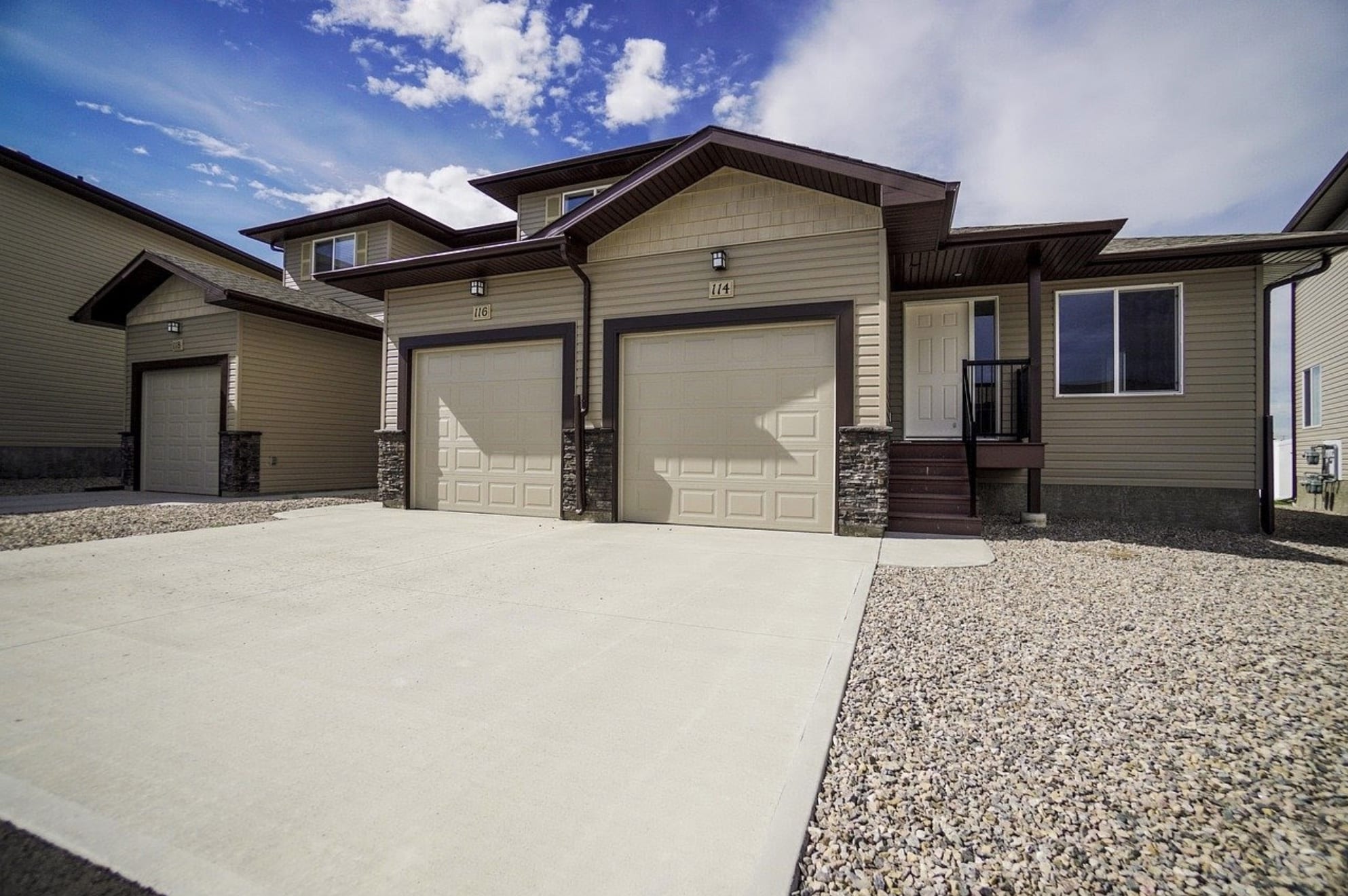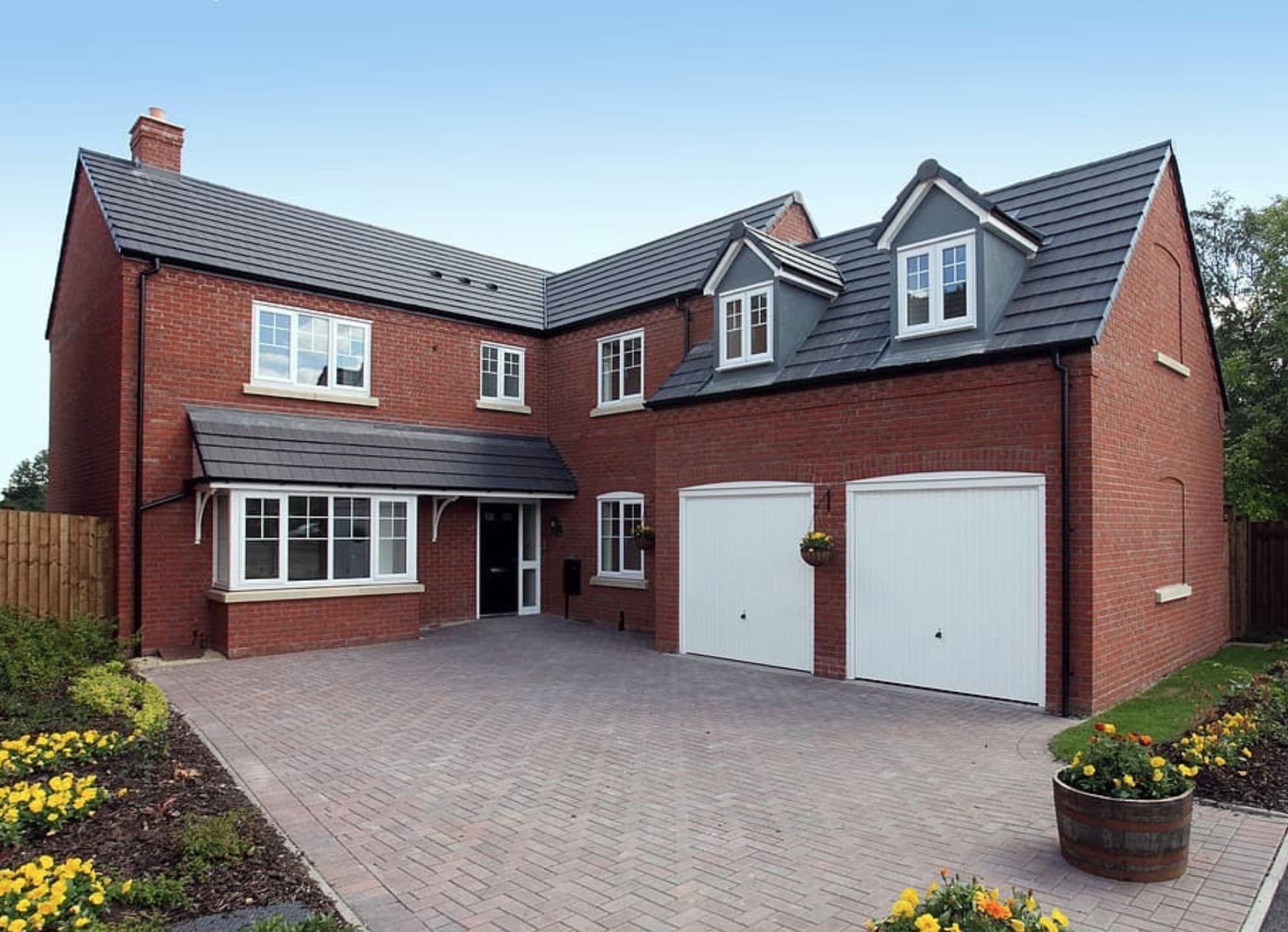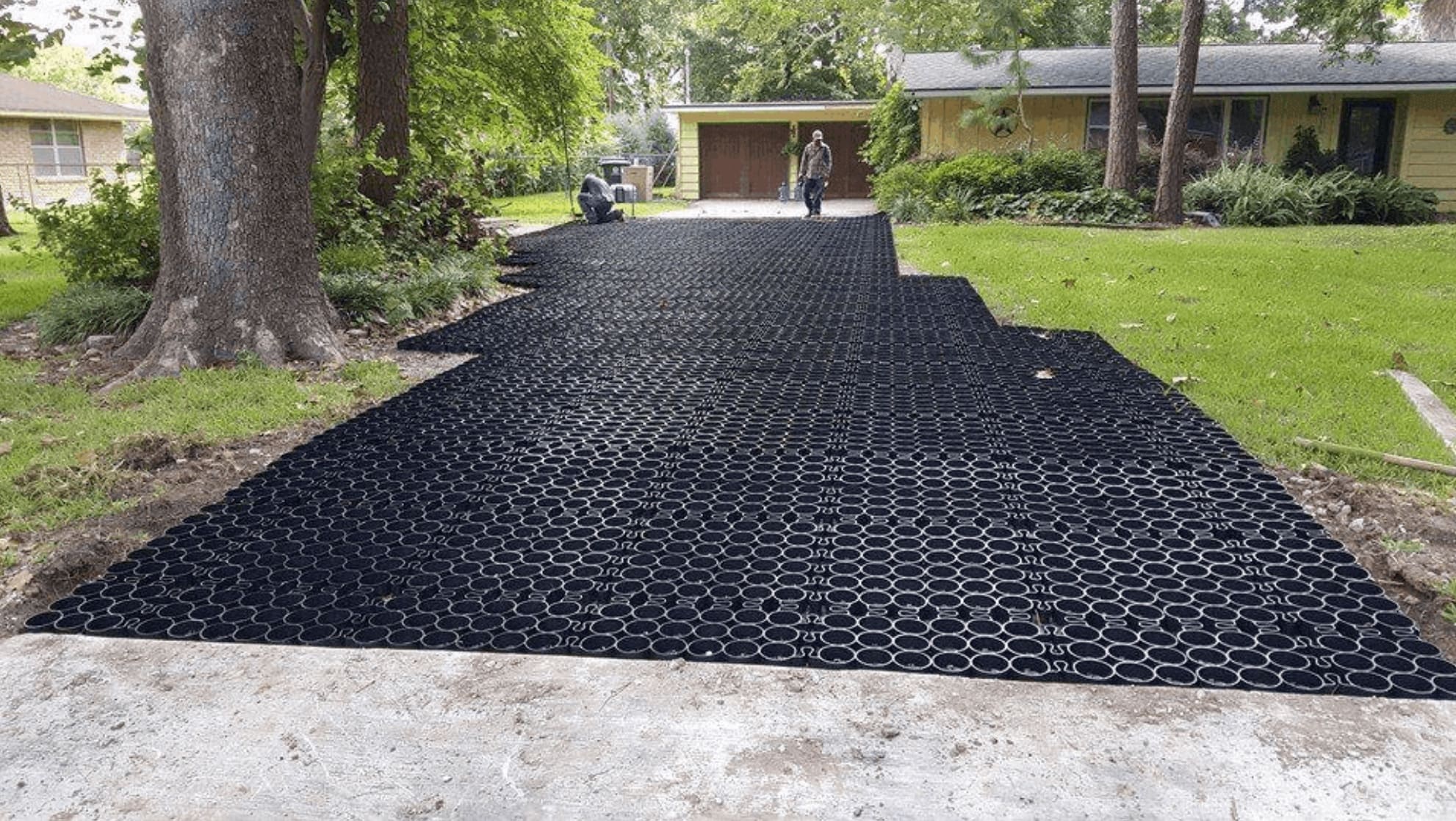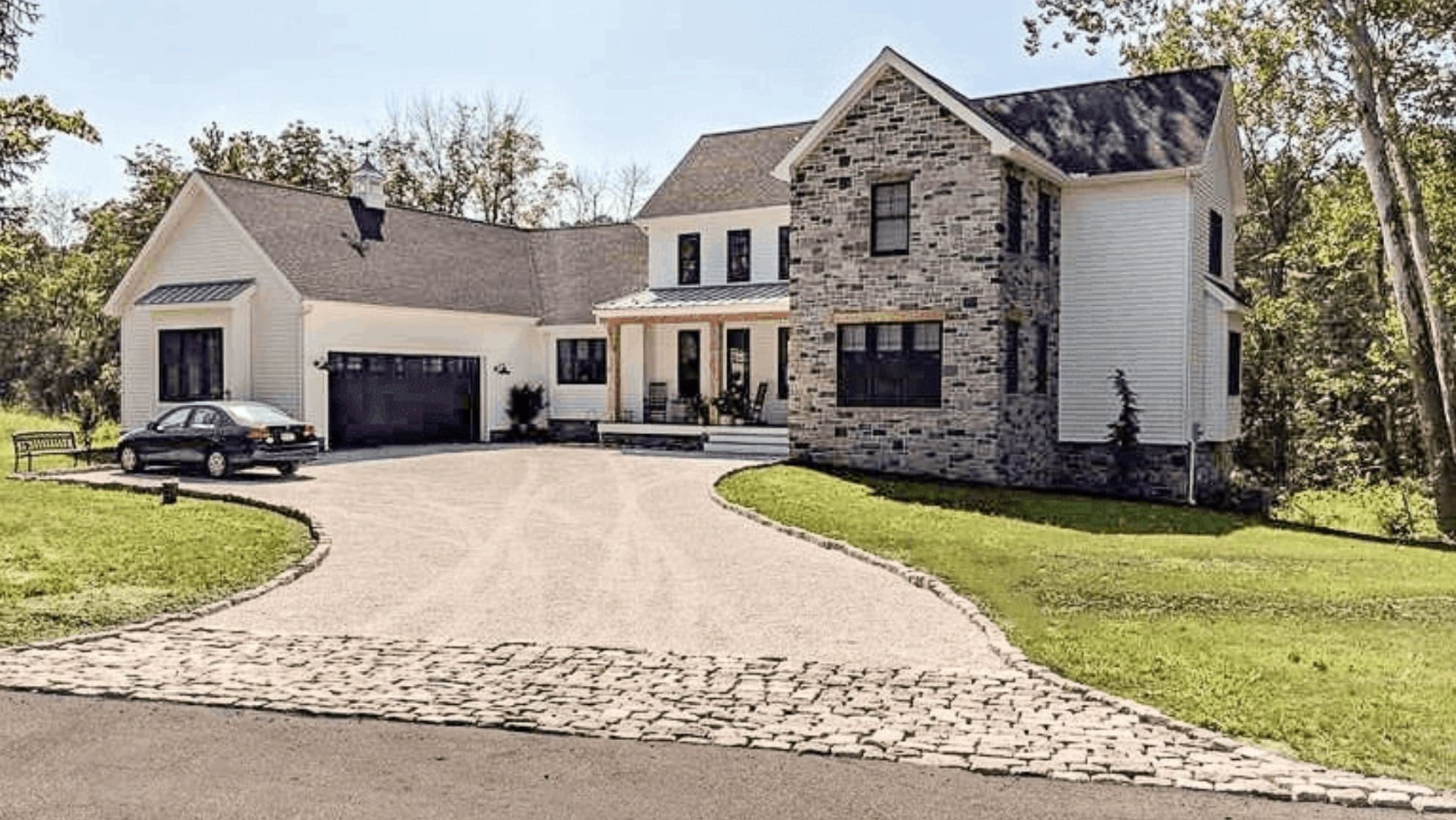Most driveways are made from either asphalt or solid concrete, but the use of pavers to create semi-permeable driveways is a different aesthetic has grown in popularity. Pavers can be made from many different materials, but brick, concrete, natural stone, and plastic are some of the most common.

There are many pros and cons to each type of material, however. In case you’re interested in building a driveway out of pavers, let’s take a look at each type of commonly used material and see how they stack up against each other:
Brick
Brick pavers are one of the most popular types of driveway pavers for multiple reasons. They possess a look that’s hard to mimic, even with dyed concrete. They’re also one of the more expensive choices because of the material cost and labor involved in installation.
Brick is not typically permeable unless specifically installed with cracks between each paver where water can drain into a substrate of gravel. However, most brick pavers are installed over a sand substrate and sloped at 2% to facilitate drainage. They are not very durable and require a lot of maintenance throughout their lifetime. This includes frequent resealing to prevent water intrusion.

Brick can be brittle and it easily cracks in cold weather. It’s also vulnerable to extreme temperature fluctuations as well. Brick is very limited stylistically and the average brick driveway lasts about 25 years with proper maintenance.
Concrete
Concrete pavers are cheaper than brick and possess almost no permeability in most cases. There are permeable concrete pavers, though, which are much better at facilitating drainage. Regular concrete pavers are typically much stronger than slab concrete, making them more suitable for heavy vehicles.
Many concrete pavers come with a lifetime warranty. Installation can take many days to complete and concrete pavers are vulnerable to cold weather and temperature fluctuations, just like brick. Concrete also needs to be regularly maintained and sealed to prevent faster-than-usual deterioration. With proper maintenance, a concrete driveway can last anywhere from 25 to 50 years.
Natural Stone
Natural stone pavers come in the form of bluestone, flagstone, limestone, granite, and other natural stones. They are typically the most expensive form of pavers and can be used to achieve a very beautiful aesthetic that’s difficult to mimic with artificial materials. Some pavers like limestone are not considered very durable, but granite is one of the more durable materials you’ll find anywhere.
As with brick and concrete, permeability can be achieved by implementing designed cracks between the pavers where water can leak into a gravel substrate, but many homeowners prefer a non-permeable look, choosing to fill these cracks with a type of filler instead. Natural stone has more design options because you can choose from different colored pavers of different shapes and sizes.
Implementing designs and contrasting color schemes is easier than it is with brick, and you don’t have to use an artificially-dyed material like you would with concrete pavers. Natural stone is more durable than brick and concrete on average, lasting 30+ years when properly maintained. They do need to be periodically resealed, however.
Loose Gravel
Loose gravel on its own is a very cheap driveway material. Without pavers, it spreads and deteriorates rapidly. It needs to be constantly replenished and grated to maintain a level surface without rutting. The only pro is that it’s very inexpensive.
Plastic Pavers with Gravel

A permable gravel driveway stabilized with plastic pavers is one of the most inexpensive yet durable types of driveways you can build. This is because a DIY gravel driveway with pervious pavers is made from recycled plastic in most instances, which is incredibly durable.
The Permeable driveway cost is rather low, thanks to the low level of maintenance required to keep it fully functional. It can be filled with a variety of different types of gravel, allowing you full stylistic flexibility to create almost any aesthetic you like. Another benefit of a geogrid driveway is the permeability.
This is important. There are different types of permeable pavers. The web kind that fold flat do not hold up very well. The plastic grid pavers are a better option and have a much longer life without the maintenance.
There are different designs of plastic grid pavers. The best design incorporates heavy duty locking tabs and integral flex joints as found in those made by TRUEGRID.
TRUEGRID produces pavers with a 100%-permeability, allowing them to handle very heavy rainfall without flooding or causing runoff. TRUEGRID makes the highest quality permeable pavers for gravel driveways, with their pavers able to last up to 60 years despite requiring almost no maintenance.
TRUEGRID Makes the Best permeable Pavers, Hands Down

With products like TRUEGRID PRO LITE and TRUEGRID PRO PLUS, you can turn any natural surface into a durable and beautiful paved driveway. For TRUEGRID PRO and TRUEGRID PRO PLUS, the installation often takes as little as one day and can be completed with almost no heavy machinery or equipment.
Only a simple excavator and a heavy roller are needed to dig the driveway and compact the gravel into the pavers once they’ve been snapped together. Once in place, your TRUEGRID permeable driveway will outperform any other driveway pavers materials in terms of durability and permeability. It will also save you a lot of money on maintenance because it doesn’t need to be sealed or resurfaced.
If you want to simply stabilize a grass lawn and turn it into a surface that can function as a driveway, TRUEGRID ROOT is perfect for creating a permeable grass driveway. TRUEGRID ROOT is incredibly easy to install and only needs to be pressed into the surface of your lawn to complete the installation.
The grass will then grow through the pavers and render them nearly invisible, depending on how short you like to cut your lawn. This prevents grass from being torn up and ruts from developing as you park and drive on your lawn.
When you stack up each driveway paving product against each other, it’s clear that TRUEGRID pavers stand head and shoulders above the rest. If you’re interested in building a highly durable, eco-friendly, 100%-permeable, stylish, clean-cut driveway or you just want to turn your part of your existing lawn into a stabilized grass driveway, contact a pavement professional at TRUEGRID today for a quote.



